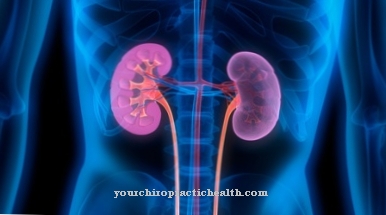In most cases, mental problems have an influence on physical processes and can express themselves as physical complaints. The Psychophysiology.
What is psychophysiology?

Psychophysiology is a field of work that researches the effects of mental, psychological processes on body functions. Psychophysiology attaches importance to the fact that both processes are considered equally alongside one another. It all began about 150 years ago when it became possible to measure the influence of psychological processes on physical processes, e.g. B. breathing, blood pressure, the heart activity in the EKG (electrocardiogram), brain waves in the EEG (electroencephalogram), etc.
These records made it possible to observe physical reactions to thought processes. Two central terms in psychophysiology are activity and (individual) reactivity. It is considered a branch of neuroscience and forms one of the basic disciplines for behavioral medicine and behavioral therapy and, in addition to other fields of work, also industrial and organizational psychology.
Treatments & therapies
A special application spectrum of psychophysiology is the investigation of mental and emotional overstrain at the workplace, so that work processes can be optimized, the work organization can be improved, meaningful break regulations can be created. It has long been known that chronic overload can increase blood pressure and favor numerous other clinical pictures.
Studies in psychophysiology can provide important insights into the development of clinical pictures. In the case of high-risk patients, outpatient field studies via portable monitoring can help to improve the drug setting of patients and to measure treatment progress using the records. In the field of clinical psychology and psychiatry, psychophysiological research helps to find explanatory models for anxiety disorders, psychosomatic disorders, personality disorders such as borderline and other psychiatric diseases. In behavior therapy, methods of psychophysiology are used to identify treatment progress.
Another important area of psychophysiological research is the study of sleep disorders, e.g. B. in the sleep laboratory, where the various body processes are recorded during sleep and important knowledge about the causes of the sleep disorders can be gained. In therapy, relaxation methods based on psychophysiological findings have proven successful, where during the exercises a reduction in breathing or muscle tension is indicated by records. One of the main areas of application is outpatient monitoring for diagnostic purposes and for monitoring body functions and physical symptoms in everyday life so that changes can be recognized more quickly in high-risk patients and, if necessary, the drug dose can be optimally adjusted.
Common methods include the 24-hour ECG and 24-hour blood pressure measurement. They provide important information about where the values change adversely in the patient's everyday life, and thus enable more holistic treatment. The monitoring can also be used to measure the progress of treatment and identify deterioration so that doctors can take appropriate countermeasures.
In the case of biofeedback, which reports a disturbance of the body function acoustically or visually in order to learn how to reduce symptoms, experience has shown that the benefits have been overestimated in most cases. The use of a lie detector to measure skin resistance to unmask lies is still considered problematic and controversial.
You can find your medication here
➔ Medicines against concentration disordersDiagnosis & examination methods
The discipline of psychophysiology can be divided into research into the fundamentals, areas of application and central physiological functional areas. The main research areas are the psychophysiology of feelings, stress reactions and other forms of arousal, which are summarized under the term activation processes. Psychophysiology also studies sleep, rest, and relaxation.
Cognitive psychophysiology researches the processing of information during stimulation of the senses and thought processes, as far as it is possible to examine them using psychophysiological methods. In the past, measurements of this kind were usually only possible in heavily shielded laboratories. Technical progress has made the devices smaller and better insulated, making examinations more easily practicable even under normal conditions using outpatient monitoring. Relationships between psychophysiological processes and personality traits have also been investigated since the beginning of psychophysiology and take up older theories about constitution and temperament.
Even in ancient times, the biological origin for personal characteristics and found their expression in the doctrine of the four juices. Relationships between body type, blood groups and hormones were later considered but could not be clearly demonstrated. Nevertheless, further research is being carried out in this area in order to perhaps find a connection at some point that is currently not yet measurable. So was z. For example, the hypothesis of type A behavior is set up, which is characterized by motivation to achieve, assertiveness and aggressive tendencies, coupled with a tendency to often get angry but not openly show this anger.
A risk of coronary artery disease (CHD) and a heart attack was suspected in the above-average performance and assertiveness, in the latent aggression a risk of high blood pressure. However, the results of numerous researches could only identify relationships that are not important. The examination methods of psychophysiology are all gentle and bloodless. They include:
- Examination and measurement of brain waves in the EEG to obtain information about brain activity
- the recording of the heart's activity via an EKG
- Measurement of blood pressure and breathing
- Measurement of temperature, perspiration and electrical conductivity of the skin
- Measurement of the cortisol level using saliva samples
However, hormonal and immunological tests can still only be carried out by taking a blood sample.













.jpg)

.jpg)
.jpg)











.jpg)